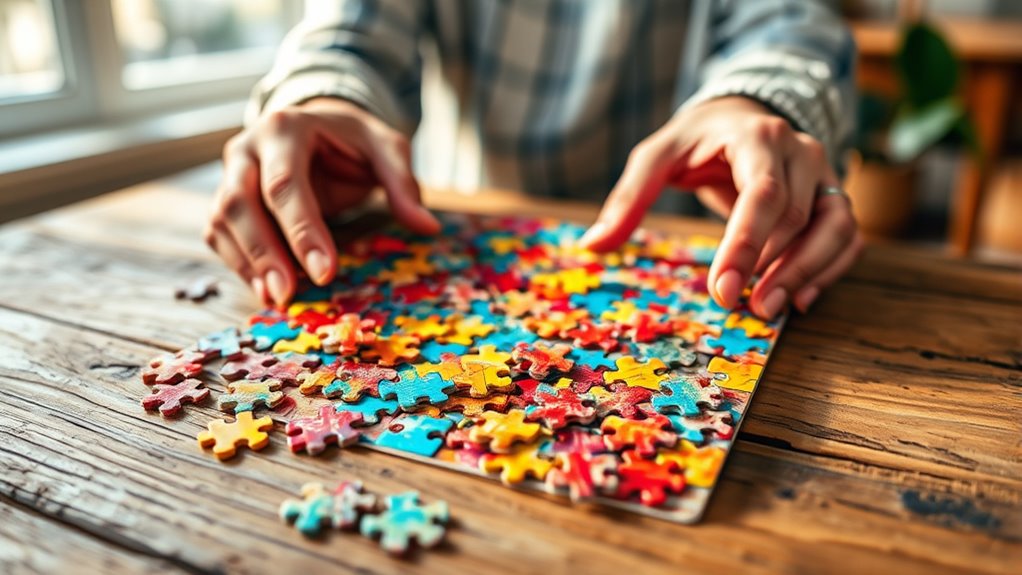Solving puzzles boosts your brain by enhancing cognitive flexibility, making it easier to adapt and switch between tasks. It improves memory and recall by strengthening neural pathways and increasing focus. Puzzles also sharpen problem-solving skills through pattern recognition and strategic thinking. They support mental agility and help you stay focused under pressure. Regularly engaging in puzzles can delay cognitive decline, keeping your mind sharp longer. Keep exploring to uncover even more ways puzzles benefit your brain.
Key Takeaways
- Enhances cognitive flexibility by encouraging new thinking patterns and adaptable problem-solving approaches.
- Improves memory and recall through strengthened neural pathways and better focus.
- Boosts problem-solving skills by challenging critical thinking and strategic analysis.
- Supports mental agility and focus, fostering creativity and resilience under pressure.
- Delays cognitive decline by providing consistent mental stimulation and maintaining neural health.
Enhancing Cognitive Flexibility
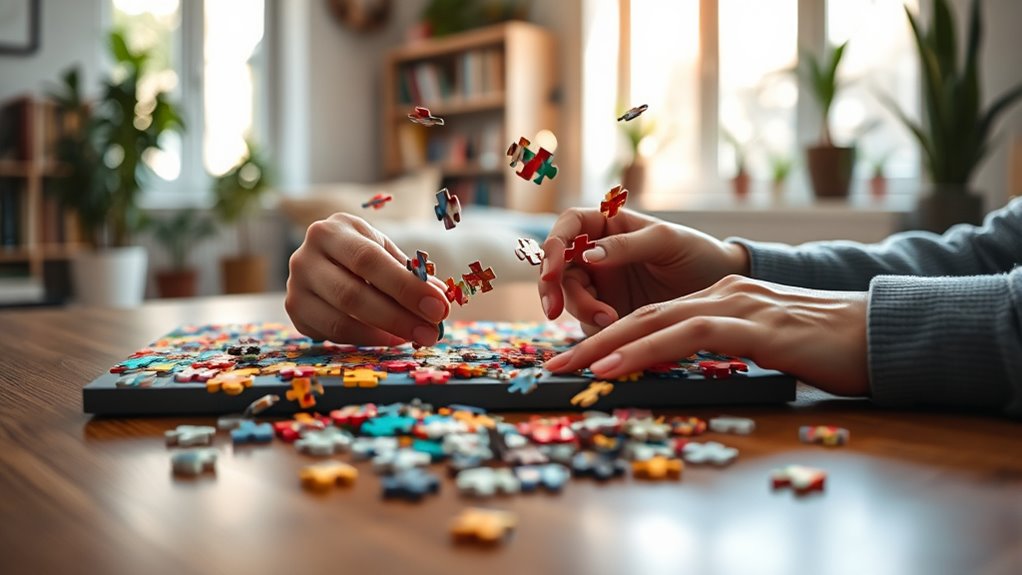
Solving puzzles actively challenges your brain to think in new ways, which directly enhances cognitive flexibility. When you engage with puzzles, you’re promoting neuroplasticity enhancement, allowing your brain to form new connections and adapt to different problem-solving approaches. This process strengthens your adaptive thinking skills, making it easier to switch between tasks and consider multiple perspectives. As you work through various puzzles, you learn to approach problems from different angles, fostering mental agility. Enhanced cognitive flexibility helps you handle unexpected challenges more efficiently and encourages creative solutions. Regular puzzle-solving keeps your mind flexible and responsive, ensuring you’re better equipped to adapt to changing circumstances in daily life. Incorporating mental exercises like puzzles can further support this adaptability and boost overall brain health.
Improving Memory and Recall
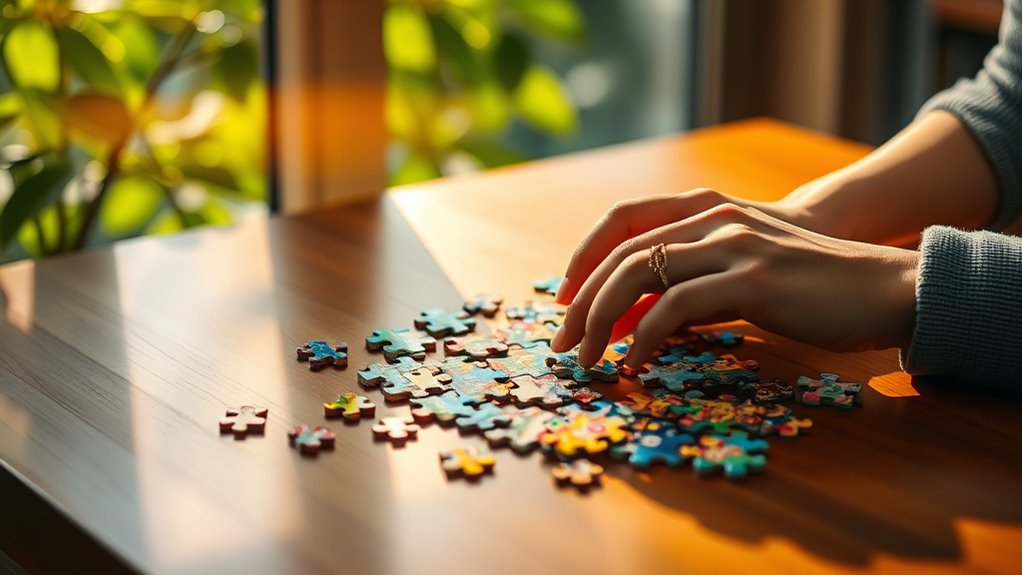
Engaging in puzzles can considerably boost your memory and recall abilities. When you challenge yourself with puzzles, you strengthen your memory retention and enhance recall accuracy. This mental exercise forces your brain to retrieve information quickly and accurately, which sharpens your overall memory skills. Here are four ways puzzles improve your memory and recall:
- Strengthens neural pathways, making memory retrieval faster.
- Improves focus and concentration, leading to better retention.
- Encourages pattern recognition, aiding in quicker recall.
- Reduces forgetfulness, helping you remember important details longer.
- Incorporating consistent attention to detail during puzzle-solving can further enhance your cognitive resilience.
Boosting Problem-Solving Skills
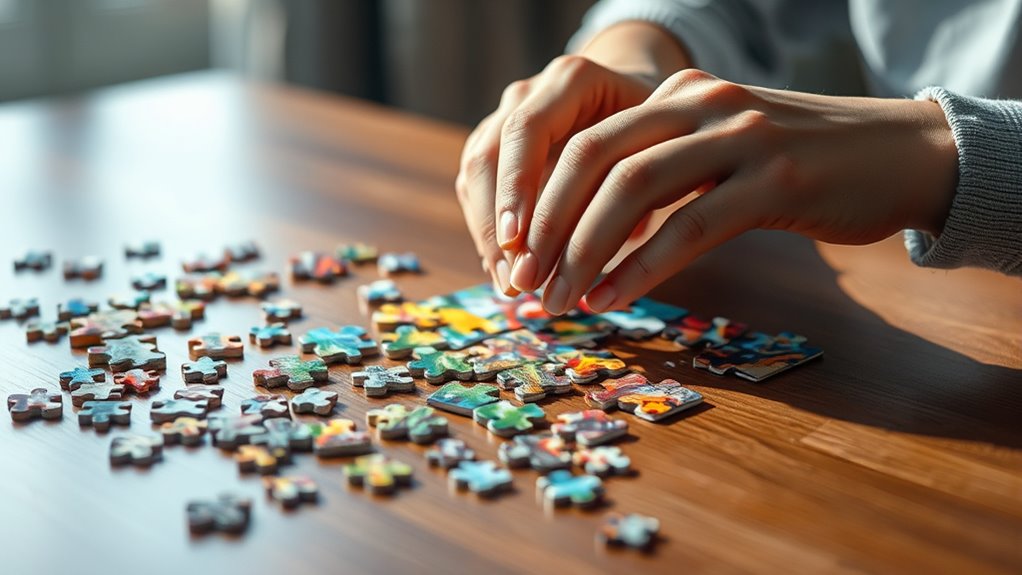
Building on the mental agility gained from improving memory, puzzles also serve as powerful tools for boosting your problem-solving skills. Different puzzle genres challenge your ability to think critically, analyze patterns, and adapt strategies. By exploring a variety of puzzles—such as crosswords, logic puzzles, or riddles—you expose yourself to diverse problem-solving approaches. Adjusting difficulty levels keeps your mind engaged, pushing you to develop new techniques and persist through complex challenges. As you progress, you learn to break down problems into manageable parts and consider multiple solutions. The variety of puzzle genres and difficulty levels ensures you’re constantly sharpening your analytical thinking, helping you become more skilled at tackling real-world problems with confidence and creativity. Incorporating mental health awareness into your puzzle practice can further enhance your overall well-being and resilience.
Supporting Mental Agility and Focus
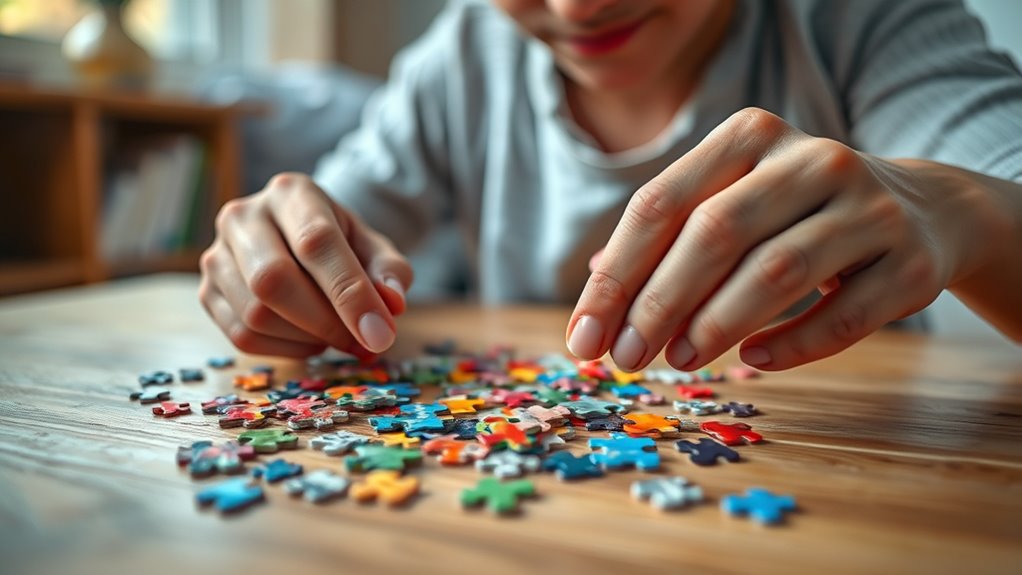
Have you ever noticed how working through puzzles sharpens your mental agility and keeps your focus sharp? Puzzles encourage you to develop creative strategies, pushing your brain to think outside the box. They also build mental resilience, helping you stay calm and focused under pressure. By consistently challenging yourself, you strengthen your ability to concentrate amidst distractions. Additionally, engaging in puzzles can activate the brain’s anti-aging effects, helping to maintain cognitive health over time. Here are four ways puzzles support your mental agility and focus:
- Boost your problem-solving confidence
- Enhance your capacity to adapt quickly
- Improve sustained attention during complex tasks
- Foster resilience when facing mental setbacks
Engaging with puzzles trains your brain to stay alert and flexible, making it easier to handle daily challenges with clarity and determination.
Delaying Cognitive Decline
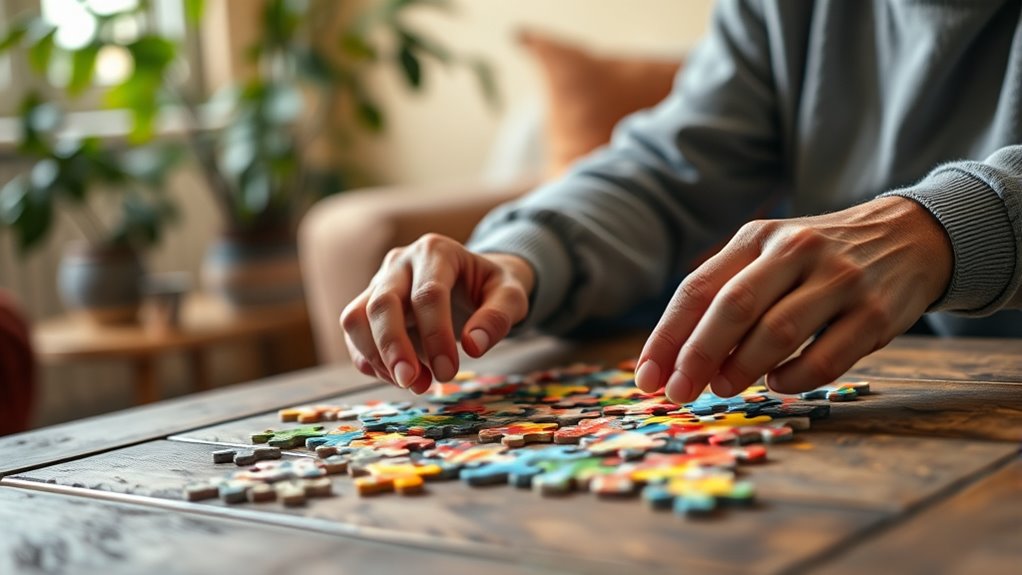
Solving puzzles regularly can considerably delay cognitive decline as you age. Engaging in brain training activities like puzzles provides essential mental stimulation that keeps your mind sharp. When you challenge yourself with crosswords, Sudoku, or other brain games, you boost neural connections and foster brain resilience. This consistent mental effort helps protect against age-related memory loss and cognitive deterioration. By making puzzle-solving a routine, you’re actively supporting your brain’s health and longevity. The more you stimulate your mind, the better your chances of maintaining cognitive functions longer into your later years. Incorporating brain training into your daily routine can enhance neural agility and reinforce cognitive defenses against decline. So, keep puzzle-solving as part of your daily routine to harness its powerful benefits in delaying cognitive decline and preserving mental agility over time.
Frequently Asked Questions
Can Puzzles Help Reduce Stress and Anxiety Levels?
Puzzles can definitely help reduce stress and anxiety levels. When you focus on solving a puzzle, it diverts your mind from worries and promotes stress relief. This mental engagement encourages a calming effect, making it easier for you to relax. Plus, completing puzzles boosts your confidence, further aiding anxiety reduction. So, next time you’re feeling overwhelmed, try a puzzle to help manage your stress and find some mental calm.
Are Digital Puzzles as Effective as Traditional Paper Ones?
Pondering puzzle effectiveness, you wonder whether digital or traditional puzzles pack a punch. Digital puzzles offer convenience, quick access, and interactive elements, while traditional paper ones foster focus, tactile engagement, and patience. Both types stimulate your brain, sharpen skills, and soothe stress, but the choice depends on your preference. Whether you prefer the digital domain or paper’s personal touch, both puzzles promote problem-solving prowess and mental agility.
How Often Should I Solve Puzzles for Maximum Brain Benefit?
You should aim to solve puzzles regularly, following the frequency guidelines of about 3-5 times a week for ideal duration of 15-30 minutes. This consistent practice challenges your brain without causing fatigue. By sticking to this schedule, you maximize mental stimulation, boost problem-solving skills, and improve cognitive function over time. Keep it enjoyable and steady, and you’ll see the best long-term benefits.
Do Puzzle Types Matter for Specific Cognitive Skills?
You wonder if puzzle types matter for specific cognitive skills. Different puzzle difficulty levels target various brain functions, enhancing skills like memory, problem-solving, or spatial reasoning. Choosing puzzles that challenge you at the right difficulty promotes better cognitive transfer, meaning improvements can extend beyond the puzzle itself. So, for maximum benefit, select diverse puzzle types that challenge your mind and match your skill level to develop a broad range of cognitive abilities.
Can Puzzles Improve Brain Health in Older Adults?
Did you know that engaging in puzzles can reduce the risk of cognitive decline by up to 30%? For older adults, puzzles boost memory enhancement and problem-solving skills, supporting brain health. By regularly challenging your mind with crosswords or Sudoku, you keep your brain active, which may delay age-related mental decline. So, keep puzzling—it’s a simple, enjoyable way to maintain your mental agility and overall brain health.
Conclusion
Just like Odysseus steering the treacherous seas, solving puzzles sharpens your mind’s navigation skills, keeping you agile and resilient. By embracing these mental challenges, you bolster your memory, problem-solving, and focus, much like forging a mighty shield. Keep at it, and you’ll strengthen your brain’s defenses against decline, ensuring your cognitive voyage remains steady and vibrant. Remember, every puzzle you solve is a step toward a sharper, more resilient mind—your personal Odyssey.
